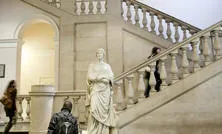01 March 2016
Call for papers: Digital Humanities 2nd early career conference
The Department of Digital Humanities is pleased to announce its second early career researcher conference in Digital Arts and Humanities research

Mapping the scope and reach of the digital humanities
20 May 2016 | King’s College London, Strand Campus
This year’s conference theme is: Mapping the scope and reach of the digital humanities. Since computing in the humanities was renamed to what it is nowadays called ‘digital humanities’ (DH), the field has shifted significantly in its scope and has gained importance as an academic discipline. The DH is envisaged to encompass a range of interests and tasks such as “refurbishing the humanities for an electronic age” (McCarty 2005), manipulating texts (Bradley 2004), gathering big data for macroanalysis (Jockers 2013), distant reading (Moretti 2013), building rather than writing for algorithmic criticism (Ramsay 2011), speculative computing and visual forms (Drucker 2008), to name a few.
The digital has undoubtedly cut across the humanities disciplines, but how wide is its reach? Is the DH inclusive enough as “a trading zone and a meeting place”, as defined by Svensson (2012)? What do the other disciplines have to teach digital humanities? Are we capable of inventing any new functions of the digital within and for the traditional scope of the humanities? How responsive are the institutions to the new demands and ideas of researching the digital? What forms and areas of collaborative research have been missing? Do the collaborative projects overshadow a single scholar’s effort and will in any way? Are the digital tools going hand in hand with the needs of humanities research, theory and pedagogy?
We would like to put these and many other historical, empirical and pedagogical aspects of the digital in the humanities on the agenda of the DDH Student Conference 2016 at King’s. We invite humanists, regardless of their technical background, to share their ideas and research on the past, present and future issues of the digital in and for the humanities.
Keynote sessions include:
- “Quality in Quantity? Stylometry on Ever Bigger Data” | Jan Rybicki, Assistant Professor of English Studies at the Jagiellonian University of Kraków, Poland
- “Community Building in the Digital Humanities” | James Cummings, Senior Digital Research Specialist for the IT Services of the University of Oxford
- “Open Access and Multi-media Monographs” | Rupert Gatti, co-founder and Director of Open Book Publishers and Director of Studies in Economics at Trinity College, Cambridge
- “Researching Born-digital Data” | Jane Winters, Professor of Digital History and Head of Publications at the Institute of Historical Research
The event will also feature a roundtable discussion chaired by Professor Willard McCarty, Professor of Humanities Computing in the Department of Digital Humanities at King's College London.
The conference committee seeks proposals for:
- Research paper presentations - submissions should include: a title, author list (including names, email addresses and institutional affiliations) and an abstract for the proposed presentation (no more than 250 words in length). Presentations on the day should last no more than 15 minutes and will be followed by five minutes of discussion time.
- Poster or digital art presentations - submissions should include: a title, author list (including names, email addresses and institutional affiliations) and an abstract for the proposed poster or digital art exhibit (no more than 250 words in length). Please note: creativity is greatly encouraged in these presentations. Your work does not need to be in the form of a traditional poster and can include digital elements (for example animation or design) - please email us to propose your idea.
Further information will be made available through the Twitter feed and Facebook page. Submissions should be made by midnight on 11 April 2016 by emailing kcldhconf@gmail.com. Please indicate in your email whether you wish to propose a presentation, poster or both. Decisions on acceptance of abstracts will be communicated to applicants no later than 18 April 2016.
